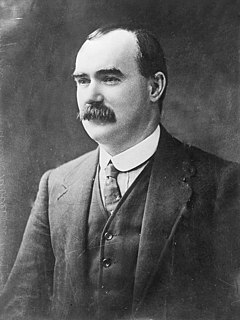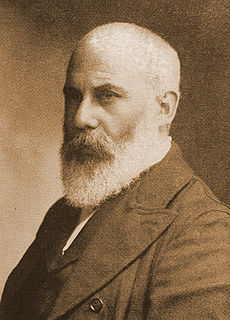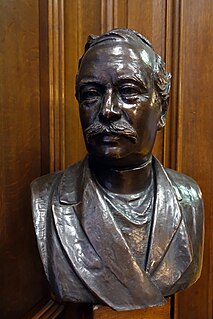Related Research Articles

Abolitionism, or the abolitionist movement, was the movement to end slavery. In Western Europe and the Americas, abolitionism was a historic movement that sought to end the Atlantic slave trade and liberate the enslaved people.

The first modern humans are believed to have inhabited South Africa more than 100,000 years ago. South Africa's prehistory has been divided into two phases based on broad patterns of technology namely the Stone Age and Iron Age. After the discovery of hominins at Taung and australopithecine fossils in limestone caves at Sterkfontein, Swartkrans, and Kromdraai these areas were collectively designated a World Heritage site. Native or indigenous South Africans are collectively referred to as the Khoisan, the Khoi Khoi and the San separately. These groups were displaced or sometimes absorbed by migrating Africans (Bantus) during the Bantu expansion from Western and Central Africa. While some maintained separateness, others were grouped into a category known as Coloureds, a multiracial ethnic group which includes people with shared ancestry from two or more of these groups: Khoisan, Bantu, English, Afrikaners, Austronesians, East Asians and South Asians. European exploration of the African coast began in the 13th century when Portugal committed itself to discover an alternative route to the silk road that would lead to China. In the 14th and 15th century, Portuguese explorers traveled down the west African Coast, detailing and mapping the coastline and in 1488 they rounded the Cape of Good Hope. The Dutch East India Company established a trading post in Cape Town under the command of Jan van Riebeeck in 1652, European workers who settled at the Cape became known as the Free Burghers and gradually established farms in the Dutch Cape Colony.

James Connolly was an Irish republican, socialist and trade union leader. Born in the Cowgate area of Edinburgh, Scotland, to Irish parents Connolly left school for working life at the age of 11, and became involved in socialist politics in the 1880s. Although mainly known for his position in Irish socialist and republican politics he also took a role in Scottish and American politics. He was a member of the Industrial Workers of the World and founder of the Irish Socialist Republican Party. With James Larkin, he was centrally involved in the Dublin lock-out of 1913, as a result of which the two men formed the Irish Citizen Army (ICA) that year, they also founded the Irish Labour Party along with William O'Brien. Connolly was the long term right hand man to Larkin in the Irish Transport and General Workers' Union (ITGWU) until taking over leadership of both the union and its military wing the ICA upon Larkin's departure for the United States, then leading both until his death. He opposed British rule in Ireland, and was one of the leaders of the Easter Rising of 1916 commanding the Irish Citizen Army throughout. Following the defeat of the Easter Rising and the arrest of the majority of its leaders he was taken to Kilmainham Gaol and executed by firing squad for his part in its proceedings.

James Keir Hardie was a Scottish trade unionist and politician. He was a founder of the Labour Party, and served as its first parliamentary leader from 1906 to 1908.

Indentured servitude is a form of labor in which a person agrees to work without salary for a specific number of years for eventual compensation or debt repayment. Historically, it has been used to pay for apprenticeships, typically when an apprentice agreed to work for free for a master tradesman to learn a trade. Later it was also used as a way for a person, to pay the cost of transportation to colonies in the Americas.

Ferdinand August Bebel was a German socialist politician, writer, and orator. He is best remembered as one of the founders of the Social Democratic Workers' Party of Germany (SDAP) in 1869, which in 1875 merged with the General German Workers' Association into the Socialist Workers' Party of Germany (SAPD). During the repression under the terms of the Anti-Socialist Laws, Bebel became the leading figure of the social democratic movement in Germany and from 1892 until his death served as chairman of the Social Democratic Party of Germany.

Thomas Mann was an English trade unionist. Largely self-educated, Mann became a successful organiser and a popular public speaker in the British labour movement.

James Edwin Thorold Rogers, known as Thorold Rogers, was an English economist, historian and Liberal politician who sat in the House of Commons from 1880 to 1886. He deployed historical and statistical methods to analyse some of the key economic and social questions in Victorian England. As an advocate of free trade and social justice he distinguished himself from some others within the English Historical School.
Thomas Hodgskin was an English socialist writer on political economy, critic of capitalism and defender of free trade and early trade unions. In the late 19th and early 20th centuries, the term socialist included any opponent of capitalism, at the time defined as a construed political system built on privileges for the owners of capital.

Sir Johannes Henricus Brand, was a South African lawyer and politician who served as the fourth state president of the Orange Free State, from 2 February 1864 until his death in 1888. He was the son of Sir Christoffel Joseph Brand (1797–1875), speaker of the Cape legislative assembly, and Catharina Fredrica Küchler. Johannes Brand married in 1851 to Johanna Sibella Zastron, a daughter of the Registrar of Deeds in Cape Town. The couple had 8 sons and 3 daughters.
The Land and Labour League was formed in October 1869 by a group of radical trade unionists affiliated to the International Working Men's Association. Its formation was precipitated by discussion of the land question at the Basle Congress of 1869. The League advocated the full nationalisation of land, and was for a brief time the centre of a working class republican network in London, with its own paper, The Republican. Despite petering out by 1873 the League had some radicalising impact on the Land Tenure Reform Association established by John Stuart Mill, which adopted a policy of taxing the unearned increment on land value under pressure from the League.

The Fabian Society is a British socialist organisation whose purpose is to advance the principles of democratic socialism via gradualist and reformist effort in democracies, rather than by revolutionary overthrow.
Early New Zealand Books (ENZB) is a project from the library of the University of Auckland, New Zealand, launched in 2005, that aims at providing keyword-searchable text of significant books published about New Zealand in the first two-thirds of the nineteenth century. It also includes the subsequently published memoirs, journals and correspondence of people active in this era. The project has been funded and managed by the University of Auckland Library and is freely available on the internet.
Martin Legassick (1940–2016) was a South African historian and Marxist activist. He died on 1 March 2016 after a battle with cancer. He was one of the central figures in the "revisionist" school of South African historiography that, drawing on Marxism, revolutionised the study of the social formation of Apartheid by highlighting the importance of political economy, class contradictions and imperialism. He was also a key figure in the independent left in South Africa from the 1970s, and a critic, from the left, of many of the analytical and strategic positions taken by the African National Congress and the South African Communist Party, as well as their understanding of South African history. The author of numerous books, mainly on the history of colonialism and capitalism, he collected many of his key political writings in his 2007 book Towards Socialist Democracy.

This is a survey of the postage stamps and postal history of South Africa.
James Frederick "Fred" Henderson was an English socialist writer and journalist, and a Labour Party politician.

Daniel De Leon was an American socialist newspaper editor, politician, Marxist theoretician, and trade union organizer. He is regarded as the forefather of the idea of revolutionary industrial unionism and was the leading figure in the Socialist Labor Party of America from 1890 until the time of his death. De Leon was a co-founder of the Industrial Workers of the World and much of his ideas and philosophy contributed to the creations of Socialist Labor parties across the world, including: Australia, the United Kingdom, Canada, and the Socialist Trade and Labor Alliance.
Morosi was a Baphuthi chief in the wild southern part of Basutoland. He led a revolt against the Cape Colony government in 1879, in defence of his independence south of the Orange River. The British refused to help the Cape Government. However, Letsie, the paramount chief and first son of Moshoeshoe, and many of the Sotho ruling establishment, rallied to support the Cape forces, and the rebellion was put down after several months of arduous fighting. He was beheaded and his body mutilated by Cape troops.

Frederick Parkin Hammill was a British trade union activist, and a co-founder of the Independent Labour Party.

The Reverend John Glasse (1848–1918) was a Church of Scotland Minister at Greyfriars Kirk, Edinburgh, Scotland, 1877-1909. He was a leading advocate of Christian Socialism, and was described by Sidney Webb as one of the "two most influential Scottish socialists".
References
- ↑ Whitehead 1993, pp. 9-16.
- ↑ Boon 1869.
- ↑ Boon 1885a.
- ↑ Boon 1885b.
- ↑ Bowie 2014.
- ↑ Documents of the First International. Lawrence & Wishart. 1872. p. 58.
- Boon, Martin J. (1869). A Protest Against the Present Emigrationists: Including Remedies for the Present Stagnation of Trade, and Finally to Remove Starvation, Pauperism and Crime.
- Bowie, Duncan (2014). Our History: Roots of the British Socialist Movement. London: Socialist History Society. pp. 17–18. ISBN 9780955513893.
- Barry, E. Eldon. Nationalization in British Politics: The Historical Background. Stanford University Press. ISBN 978-0-8047-0197-6.
- Boon, Martin James (1885a). The History of the Orange Free State. W. Reeves.
- Boon, Martin James (1885b). The Immortal History of South Africa: The Only Truthful, Political, Colonial, Local, Domestic, Agricultural, Theological, National, Legal, Financial and Intelligent History of Men, Women, Manners and Facts of the Cape Colony Natal, the Orange Free State, Transvaal, and South Africa. W. Reeves.
- Whitehead, Andrew (1993). "Martin J. Boon". In Bellamy, Joyce M.; Saville, John (eds.). Dictionary of Labour Biography. A. M. Kelley. ISBN 978-0-678-07008-6.
- Whitehead, Andrew. "Martin James Boon, 1840-1888". The Website of Andrew Whitehead. Retrieved 2015-07-25.